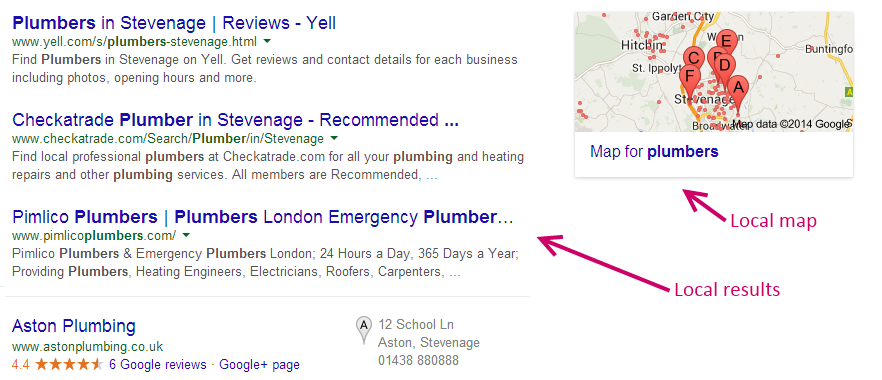One of the things many webmasters and site owners get confused about is the different results Google can return for each user. You might expect this to be the case in different countries or regions, but search results can also vary for two people sitting in the same room.
After spending months working on the SEO of your site, you may be disappointed to find that it doesn’t appear consistently for all users making a search on Google. This article will explain the potential reasons for the differences, and help you to understand what’s happening.
[Tweet “Factors for varying results in Google include location, personalisation and algorithm changes.”]The main reasons for users getting varying results in Google are location, personalisation and algorithm variations.
Google’s aim is to deliver the most accurate and relevant results for each individual search engine user, so the variations are entirely intentional. As search engines become increasingly sophisticated and intuitive they can provide more accurate search results.
Related: How do search engines work?
Before we continue, if you haven’t already got online, or are looking for a new home for your website, we offer hosting to suit everyone.
Check out our Web Hosting and WordPress Hosting packages.
Let’s look at the three main factors influencing search results in a little more detail.
Why do Google results look different?
1) Location.
It’s important to understand that local versions of Google results look different depending on where you are searching from. Your site may be ranking well on Google.co.uk, but it may be nowhere to be seen on Google.com.
Even if users are on the same version as each other, Google can detect their geographical location and provide customised results.

Remember that Google is always trying to deliver the best customer experience with its search engine. If you type ‘plumber’ into the search bar you’d hope the results to be within your local town.
You’ll generally see maps and addresses of local businesses on the right-side column when you make this kind of search. Of course, a user performing the same search hundreds of miles away is going to see local results for their own area, so their results are likely to be different from yours.

Local search differences can also be explained by the way a search engine like Google is structured. Google is comprised of thousands of servers, and each of these is part of a datacentre.
The datacentres are effectively branches of the search engine, and they are spread far and wide. Because the datacentres are independent of each other, they may have different versions of updates, and all will deliver slightly different search results.
Datacentres also take account of their geographical location in the results they deliver, so a user in London will not see the same results as one in Madrid.
2) Personalisation.
The search results returned by Google are personalised to a user’s previous searches. Unless a user blocks them, cookies mean that search history data is stored for up to 180 days.
If you’re logged into a Google account when you make searches, personalisation goes even further. If you regularly click through to specific sites when you review search results, Google will learn your habits and prioritise these sites when it delivers future results.
This all helps the user experience, but webmasters and site owners need to understand the implications with regards to the placement of their site in search rankings.
If a user has a Google+ account, personalisation is even more sophisticated. As well as taking account of his own search history, Google+ will take account of preferences of a user’s connections.

For example, if one of your connections likes a particular local florist, that company may appear higher on the results page when you make your own searches.
Google has gone on record saying that they support diversity, and the intention is to personalise search results but also to give a user full access to what’s available on the web. From an SEO perspective, this adds some further complexity to getting your site ranking where you want it to appear.
3) Algorithm changes.
Google is constantly updating its algorithm to keep up with changes to the web and the way people search it.
Major updates like Panda and Penguin take place every few months, but small tweaks are made on a continuous basis.

Some users may be searching a version of Google where changes have been made to the algorithm, and those with a different version may see different results.
It’s useful to understand the factors influencing why users may get different search results, but there are limits as to what you can do about them.
From an SEO perspective, concentrate on the factors you can control and be aware that ranking in Google is always going to vary between users.
Related: What are Google’s search ranking factors?
Your Say!
Have you noticed dramatic changes in the search engine listings when you have searched from different locations? Do you log out of your Google account to try and gauge more accurate rankings? Let us know in the comments!

Hi Ricky, do you know a way to get Google search results as if you were located in another country? I found several articles about it but they seem outdated.
Hi Roman,
The easiest way is to go via a proxy or VPN. There are a few Chrome extensions such as ZenMate that offer some of this functionality.
However if you want to really pick and choose your location to search from its probably best to use a paid VPN service.
One of my colleagues uses http://www.privateinternetaccess.com. It’s only a few dollars a month and they have over 1000 serves in 11 different countries. It’s pretty easy to use.
Thanks!